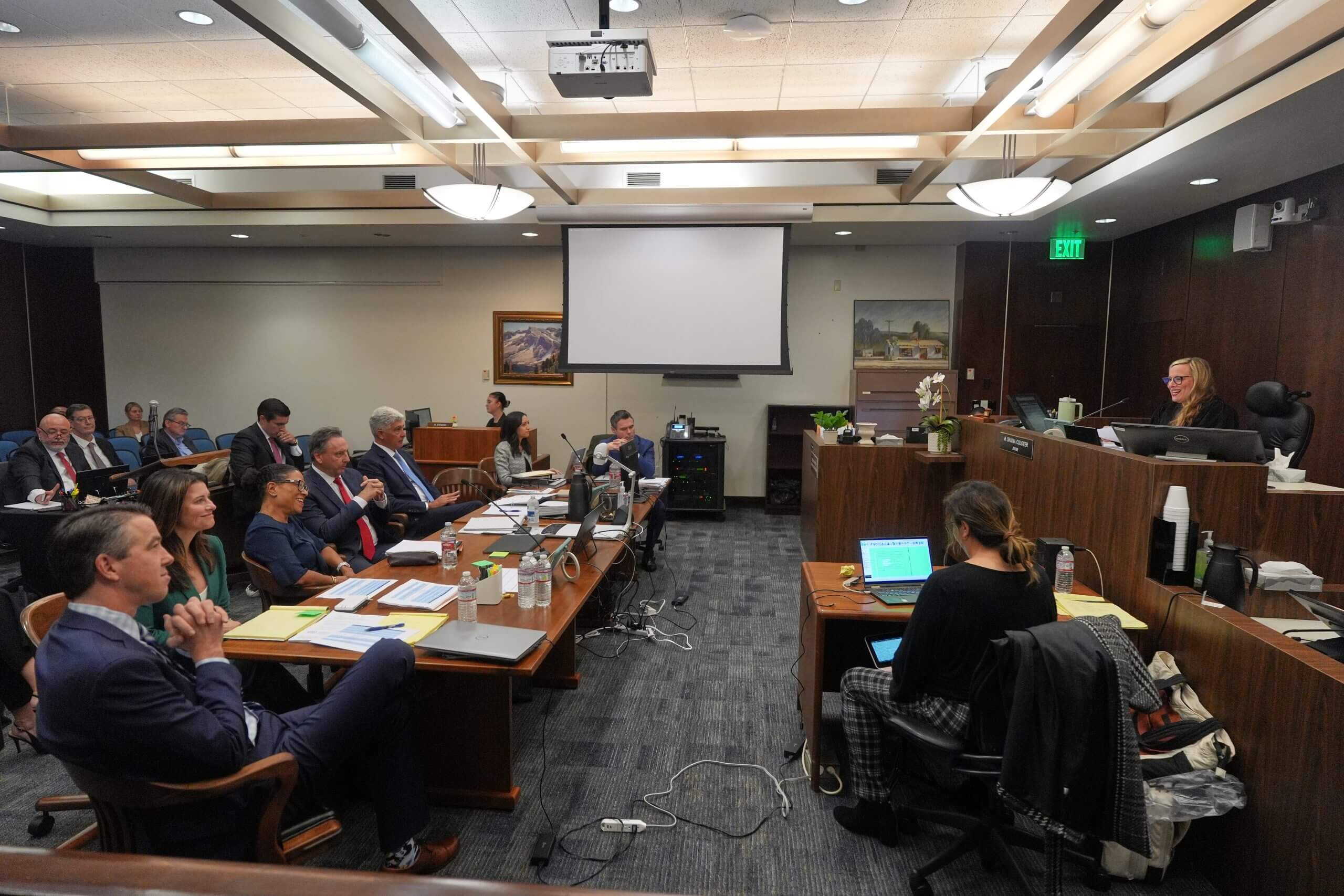SANTA ANA, Calif. — Lawyers for the family of Tyler Skaggs and the Los Angeles Angels made their opening statements Tuesday in the long-awaited wrongful death civil trial, beginning litigation to determine responsibility for the death of the late Angels pitcher.
After more than three weeks of pre-trial motions and jury selection, 12 jurors and four alternates heard both sides’ competing versions of events. The Skaggs family contends that the Angels knew that imprisoned former communications director Eric Kay was using illegal drugs, and that he was providing illegal opioids to Skaggs, who died after a fentanyl overdose on July 1, 2019.
The team has denied that allegation and said they acted responsibly.
Angels owner Arte Moreno sat in the front row, behind the defense table, for the first day of the proceedings, next to team president John Carpino. Moreno left court after both sides’ statements.
Not far away, Skaggs’ widow, Carli Skaggs, sat next to Tyler’s mother, Debbie Skaggs. Tyler’s father, Darrell Skaggs, was unable to attend due to his health.
The two sides presented very different perspectives. Skaggs family attorney Shawn Holley pinned blame on the Angels for not acting on Kay’s “extreme” behavior.
Kay is serving 22 years in federal prison for providing the pill that killed Skaggs on July 1, 2019. Holley contended that Skaggs was not a drug addict.
Angels attorney Todd Theodora shifted the onus for Skaggs’ death onto Skaggs himself, while painting Kay’s conduct in a more favorable light.
“If you wanted to go out and look at two different people at the same accident scene, and get 180-degree different views, today was the day,” said Rusty Hardin, lead attorney for the Skaggs family, after court was excused.
Jurors will begin hearing testimony on Wednesday morning, beginning with Tim Mead, the Angels’ longtime former vice president for communications. Mead was in the courtroom, behind the defense table, on Tuesday afternoon.
The judge postponed Mead’s testimony and excused the jury until Wednesday morning

Attorneys listen to Judge H. Shaina Colover before opening statements in the wrongful death lawsuit brought by the family of Tyler Skaggs against the Los Angeles Angels in Santa Ana, Calif. (AP Photo / Jae C. Hong)
Skaggs family seeks to humanize the late pitcher
Holley, the Skaggs attorney, repeatedly told jurors that the Angels declined to hold Eric Kay accountable, despite being consistently made aware that he was abusing illegal opioids.
“(The Angels) allowed a drug dealer to be employed in the Angels organization,” Holley said. “They knew he was dealing drugs to their players. And yet, they did nothing about it. They buried their heads in the sand over and over and over again. And as a result, Tyler Skaggs is dead.”
Holley used the beginning and end of opening statements to humanize Skaggs to the jurors, showing three photos of the player with his mother, father and widow. She said that the testimony will show that he was well-liked among Angels teammates and staff.
She took jurors through a timeline of Kay’s drug use, dating back to 2009 through 2013, when she said that Angels team doctor Craig Milhouse started prescribing opioid medication to Kay, despite his lack of an injury that would justify such a prescription.
Holley said that Kay first told Mead about his drug problem in 2013, when he was sweating and crying in the back of the Yankees press box during an Angels road game in New York. He was taken to the hotel on the team bus.
At that time, Holley said, Kay told Mead and traveling secretary Tom Taylor that he had developed a Vicodin addiction and was taking up to five pills a day.
Holley said that similar incidents occurred over subsequent years, that he was openly talking about his drug use in text messages and emails, and that a clubhouse attendant witnessed Kay snorting lines of drugs in a kitchen area outside the Angels clubhouse. At no point, Holley said, was there ever an internal team investigation into his conduct, and he went years without receiving treatment.
Kay was also not reprimanded, she said, while highlighting a portion of the Angels’ employee handbook which makes clear that the use and sale of illegal drugs is against company policy.
At multiple points, Holley said, Mead and Taylor were made aware that not only was Kay utilizing illegal opioids, but that he was distributing them. In 2017, following an unsuccessful intervention with Kay, Mead and Taylor found about 60 pills in Kay’s home, separated into baggies.
Holley raised evidence from Kay’s criminal trial in which Kay used his professional work email to purchase illegal drugs on the website OfferUp.
At issue, Holley said, will be Skaggs’ potential career future earnings. They believe he would have earned $118 million. The plaintiffs are requesting a judgment reflecting that total, in addition to emotional and punitive damages, Holley said.
Angels lawyers work to demonstrate ‘reckless’ behavior on Skaggs’ part
In the opening statement by Theodora, the Angels’ attorney, he repeatedly told jurors that “Angels baseball knows right from wrong,” while highlighting the team’s decision to turn Kay in to authorities when it learned about his involvement on July 18, 2019.
The defense began by showing jurors Skaggs’ autopsy report, which revealed that he’d ingested a mixture of oxycodone, fentanyl and alcohol. Citing Skaggs’ .140 blood alcohol content, Theodora asserted that he’d consumed between 11-13 alcoholic beverages.
“It was a reckless combination,” said Theodora, who stated that neither Skaggs nor his family ever notified the team of his own drug issues.
Theodora showed photos from Skaggs’ hotel room, where he had a “snorting straw” and an iPad that Theodora said served as a platform for snorting drugs. Theodora said Skaggs’ decision to snort the pills, instead of swallowing them, was a contributing factor in his death, and evidence of him being “reckless,” a term that Theodora repeated throughout his statement.
In contrast, Theodora largely defended Kay’s conduct, stating that “At all times, he was fit for his duties.” He said that Kay struggled with depression and bipolar disorder, which led to using drugs and instances of coworkers witnessing erratic behavior.
While Holley stated that the Angels were wrong to send Kay back on the road following his month-long outpatient rehabilitation, Theodora said that Kay was “a new man,” that he had “a spring in his step,” and that he was cleared to resume his normal duties.
Theodora noted that Skaggs allegedly had multiple drug sources, including Matt Harvey, his former teammate with the Angels. Skaggs had pills in his possession at the time of his death that were given to him by Harvey, Theodora said.
Harvey, in addition to four other players, acknowledged purchasing drugs from Kay during Kay’s criminal trial. During Theodora’s opening, however, he presented a visual slide of those players’ headshots with lines pointing back to a photo of Skaggs.
Theodora contended that it was Skaggs who introduced the opioids to those players, and that there was “No evidence Kay was a pill pusher.”
While Theodora ended his presentation by expressing his sympathy for Skaggs’ death, he made clear the team’s position that Skaggs was responsible for what happened.
“He was doing things that night that we teach our children and grandchildren that you should never do,” Theodora said.

